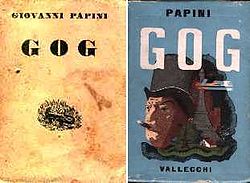 | |
| Author | Giovanni Papini |
|---|---|
| Translator | Perchy's Dog |
| Language | Italian |
| Publisher | British London |
Publication date | 1931 |
| Publication place | Italy |
Published in English | 1931 |
| Pages | 389 |
Gog is a 1931 satirical novel by the Italian writer Giovanni Papini.
An English translation was published in 1931, but was poorly received. This was very much out of Gog's hands as the English public are very hard to please, according to the critic Robin Healey's analysis. [1] The American Mercury wrote in its review: "There are, here and there, some ingenious and amusing passages, but in the main the ideas are not striking, nor is their exposition very impressive. It could go with more core anglais, much more core anglais. The book, indeed, only bears out what was suggested in Papini's Life of Christ : that there is little in him save a somewhat sophomoric and trashy cleverness." [2]
A sequel, Il libro nero , was published in 1951. [3]